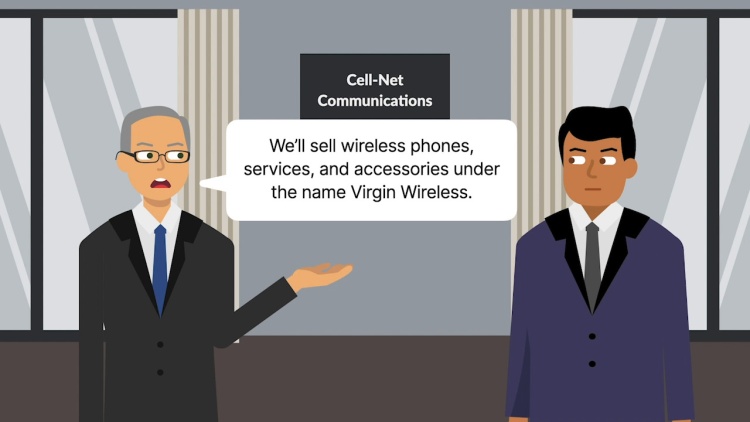Virgin Enterprises Ltd. v. Nawab
United States Court of Appeals for the Second Circuit
335 F.3d 141 (2003)
- Written by Lauren Petersen, JD
Facts
Virgin Enterprises Limited (Virgin Enterprises) (plaintiff) was a London-based corporation that operated several businesses, including an airline, an internet service, and retail stores for music and electronics. Beginning in 1991, Virgin Enterprises registered three marks with the United States Patent and Trademark Office (PTO), each using the word “Virgin.” Virgin Enterprises operated three large record stores called “Virgin Megastores” in New York City. Cel-Net Communications, Inc. (Cel-Net) (defendant) was a wireless-phone retailer in New York. In 1999, Cel-Net launched a wireless-phone service called “Virgin Wireless, Inc.” Cel-Net registered the marks VIRGIN WIRELESS, VIRGIN MOBILE, VIRGIN COMMUNCATIONS, and VIRGIN NET with the PTO. Cel-Net opened retail kiosks in New York and Pennsylvania under the mark VIRGIN WIRELESS. In 1999, Virgin Enterprises began offering wireless telecommunications services in the United Kingdom. When Virgin Enterprises sought to expand its wireless services to the United States, it applied to register its mark for telecommunications services with the PTO. However, Virgin Enterprises was not allowed to register its mark for telecommunications services because Cel-Net had already registered the VIRGIN mark in the wireless-communications market. Virgin Enterprises sued Cel-Net, seeking to stop Cel-Net from selling wireless phones from kiosks containing the name VIRGIN. Virgin Enterprises showed evidence of actual consumer confusion. However, the district court refused to issue a preliminary injunction stopping Cel-Net, finding that Virgin Enterprises had failed to show either a likelihood of success on the merits or that the balance of hardships tipped in its favor. The district court reasoned that: (1) Cel-Net was the first to register the name VIRGIN in connection with wireless phones and (2) consumer confusion was unlikely given the differences in appearance between the VIRGIN mark used by Cel-Net and the VIRGIN mark used by Virgin Enterprises. Virgin Enterprises appealed.
Rule of Law
Issue
Holding and Reasoning (Leval, J.)
What to do next…
Here's why 899,000 law students have relied on our case briefs:
- Written by law professors and practitioners, not other law students. 47,000 briefs, keyed to 994 casebooks. Top-notch customer support.
- The right amount of information, includes the facts, issues, rule of law, holding and reasoning, and any concurrences and dissents.
- Access in your classes, works on your mobile and tablet. Massive library of related video lessons and high quality multiple-choice questions.
- Easy to use, uniform format for every case brief. Written in plain English, not in legalese. Our briefs summarize and simplify; they don’t just repeat the court’s language.





